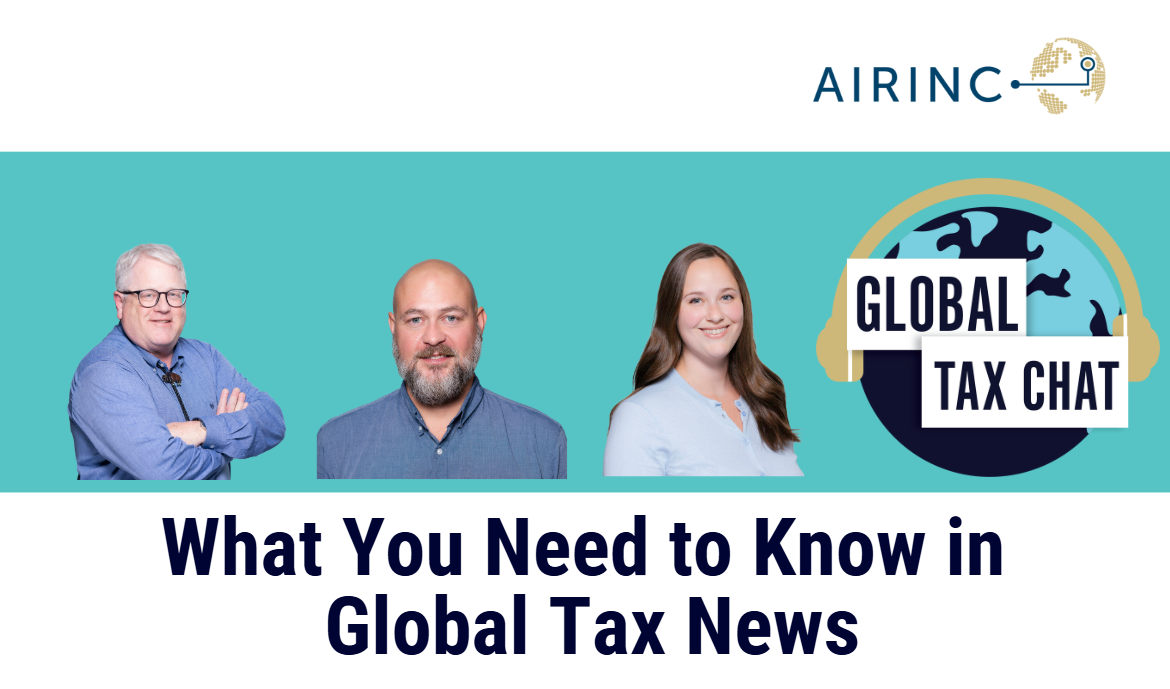Our inaugural Global Tax Chat covered a range of tax topics useful to global mobility managers. Here is a quick summary of the topics we discussed with our host, Robert Zeitz.
Outlook for US tax changes
US tax legislation is most likely at a standstill due to a divided Congress, as there are very few tax priorities with bipartisan support. Any major changes will likely occur after the November 2024 election cycle, dependent on the results in Congress and the White House. Most pressing will be the Fiscal Cliff when the 2017 Tax Cuts and Jobs Acts (TCJA) provisions expire at the end of tax year 2025. Absent new legislation, a variety of individual tax rules will revert to Obama era status, effective 2026, including an increase in the top marginal rate from 37% to 39.6%, reductions of the standard deduction, the return of personal exemptions, and elimination of the state and local tax (SALT) deduction limitation of $10,000. A divided Congress and White House would likely result in a lapse of TCJA, but there will be pressure to develop bipartisan support for extending and modifying the TCJA tax provisions.
Looking at 2023, we already know what tax provisions the Biden administration will propose based on the State of the Union speech, with tax hikes for high income taxpayers and corporations. Separately, there is a fringe GOP proposal to eliminate the Federal individual, corporate, and estate taxes (and the IRS entirely), and replace it with a 30% national sales tax. Prospects for either tax plan are slim over the next two years. The national sales tax proposal would apply to most goods and services, including groceries, health care, rent, car and home purchases, and credit card interest. The national sales tax would be in addition to any existing state sales tax, which generally ranges from 6-9%. The proposal includes Federal ‘prebate’, where each household would receive a monthly check equal to 23% of the federal poverty threshold for their household size (For 2023, this would be $279.45/month for a single adult, and $98.52/month for each additional person in the home) to cover the sales tax on basic goods. This national sales tax proposal is currently dead-on-arrival, as President Biden has vowed to veto a bill, even if it were to pass a perilous journey through Congress, which is highly unlikely. It’s worth keeping tabs on this tax transformation proposal in the event the GOP earns a supermajority in 2024, but even then, the regressive nature of the shift would be too detrimental to low-income GOP states to earn much support.
By contrast, there have been numerous tax changes at the state level. During our AIRINC tax updates for 2023, we counted 15 states that enacted tax rate reductions in 2023 or that are scheduled for 2024. States enjoyed unprecedented budget surpluses in 2021 and 2022, primarily due to increased tax collections and temporary Federal COVID relief funds. US states have responded by reducing reliance on individual income tax revenue and increasing sales taxes. Some states such as Georgia are even proposing abolishing their individual income tax over the next few years. If future state budget surpluses dry up, will states need to increase tax collections?
Compounding the issue is that states are now competing for mobile remote workers that can choose a work location independent of their employer office location(s). High tax states like California and New York are experiencing a workforce exodus, while no-tax states like Florida and Texas are welcoming new residents. Income tax revenue is a key budgeting inflection point for most states, how will they handle it going forward? AIRINC will be monitoring for the latest state tax developments.
Expat Concession updates
Netherlands: From 1 January 2024, a new cap of EUR 223,000 is being implemented on which the 30% Ruling could apply. The 30% ruling allows a portion of the salary of qualifying expatriates to be paid tax-free. The threshold amount is tied to the salary of a government minister, which is indexed annually. The maximum exclusion would be 66,900 at the 2023 salary level. Qualifying expats must have a minimum wage of EUR 41,954 (2023).
Assignments beginning before December 31, 2022, are grandfathered in with no cap on the 30% ruling until 2026. However, for assignments beginning after January 1, 2023, there is no cap for 2023, but the cap will apply for 2024 onwards.
The net effect on higher income expatriates is in increase in the top marginal rate of 34.65% with the ruling to 49.5% for income that exceeds the threshold. This will have an impact to global mobility programs with expatriates inbound to the Netherlands.
Belgium: The expatriate ruling was completely revised in 2022. Currently the tax concession provides for a 30% exclusion for qualifying assignees, up to the threshold wage of EUR 300,000 (the maximum exclusion is EUR 90,000). Additionally, the exclusion also applies to wages subject to Belgium social security contributions. Regulations have recently been amended, clarifying the details when filing the expat tax status regime application request. Inbound expats must prove that they earn a gross taxable salary of more than EUR 75,000. For this proof, inbound expats (excluding researchers) can present salary items that are known and fixed when filing the application. Variable payments and target bonuses cannot be considered, unless a minimum part of the variable salary will be earned continuously throughout the year (i.e., monthly pay-outs). Furthermore, it must be re-confirmed after the end of each income year that the taxable salary (including any actual bonus pay-outs) meets or exceeds the minimum taxable salary threshold. Regulations also specify the time and format for applying upon arrival, and an annual election at beginning of the tax year.
In addition, a wide swath of countries, across all continents, have implemented some form of a ‘Digital Nomad Visa’, which provide tax preferential status to the new class of mobile remote workers. Generally, employees must substantiate a minimal annual income to qualify, and the term limit tends to be 1-2 years. Not all digital nomad visa holders enjoy tax concessions, so applicants should check the host country tax and immigration laws to plan accordingly. Spain for example, has recently modified their tax concession known as the Non-resident Regime, making it easier to qualify, including remote workers. Qualifying expatriates can take advantage of a two-tier tax rates – 24% on incomes up to EUR 600,000 and 47% on income exceeding the threshold.
Updating Hypothetical Tax Withholding
We often get questions from global mobility programs that have tax equalization policies about how to update estimated hypothetical tax. But what is hypo tax? It is a payroll deduction that approximates the employees share to the income tax costs during the assignment. It is based on compensation the employee home-based remuneration such as salary, commissions, overtime, bonuses and excludes assignment-related compensation such as goods and services allowance, housing allowance, etc. The hypothetical withholding tax is sometimes reconciled at the end of year with a settlement that ‘trues up’ the hypo tax withheld throughout the year to a final employee tax obligation.
The first quarter of the year tends to be the most popular time for companies to update the hypothetical tax withholding calculations for their equalized assignees, concurrent with annual salary adjustments. The beginning of the year also marks the point in which most calendar year countries update tax legislation. It’s important to update hypothetical tax calculations over the course on an international equalized assignment for changes in salary, family size or marital status, and home country tax and social security law changes. Typically, a separate hypo tax is applied to any supplementary payments such as bonuses and equity awards. Failure to update hypothetical tax withholdings may result in a shortfall in hypo tax paid, resulting in material equalization settlements, and/or employee discontent.
For global mobility programs, it is important to implement hypo withholding at the initiation of the assignment, switching from domestic payroll tax withholding to hypo withholding. And just as important, to switch back to domestic withholding at completion of the assignment.
We hope you found our summary of the premier Global Tax Chat helpful. Our next Global Tax Chat will be in May 2023 and we look forward to seeing you then.
Blog authored by:
- Pat Jurgens - Director, Global Tax Research & Consulting
Pat is beginning his 40th tax season in expatriate tax compliance. Learn more about Pat through our blog! - Jeremy Piccoli - Director, Global Tax Solutions
Jeremy knows about taxes in over 280 countries & tax jurisdictions through his work with AIRINC's International Tax Guide






%20(33).png)

%20(77)%20(1).png)

